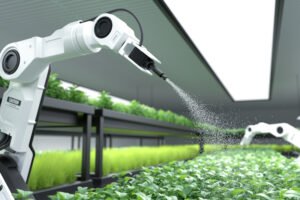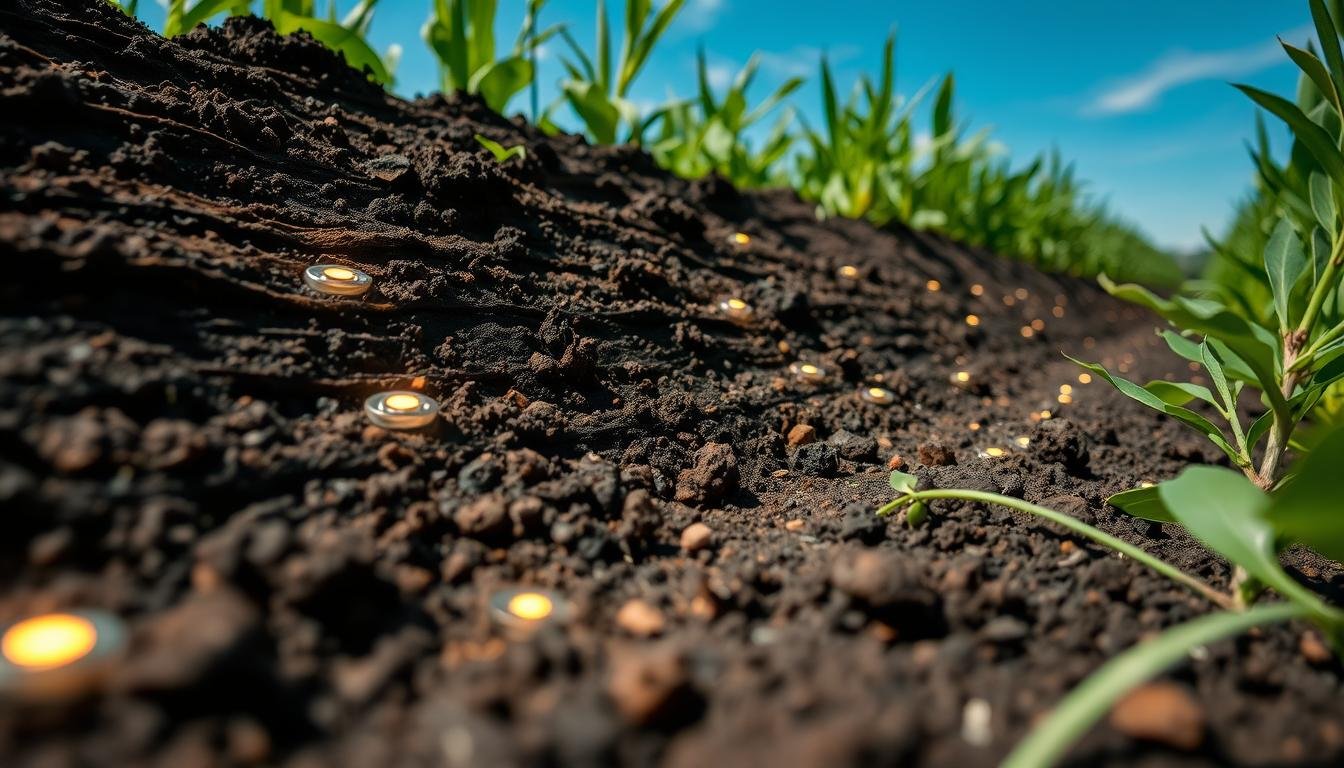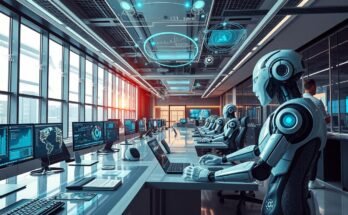The agricultural industry is changing fast, thanks to Artificial Intelligence (AI). AI is making farming more precise and efficient. It’s helping with everything from monitoring crops to managing data.
AI is set to change how we grow food. It’s solving old problems and making farming better for the planet. This article looks at how AI is changing farming for the better.
Key Takeaways
- AI technology is revolutionizing the agriculture industry, driving advancements in precision farming, smart greenhouses, and data-driven decision making.
- Predictive analytics and machine learning are optimizing crop yields and improving resource management.
- AI-powered systems are enhancing pest detection, prevention, and agricultural automation.
- Smart greenhouses and controlled environments are leveraging AI for climate control and energy efficiency.
- The future of sustainable farming lies in the continued integration of AI technology to increase productivity and reduce waste.
The Rise of AI in Modern Agriculture
Precision farming and crop monitoring are changing the game in agriculture, thanks to AI. Now, sensors and computer vision systems let farmers watch over their crops in real-time. They can see how healthy the crops are, the soil conditions, and the weather. This helps farmers make smart, data-based choices.
Precision Farming and Crop Monitoring
AI is changing how we manage crops. Advanced sensors and computer vision can spot tiny changes in plants and soil. This gives farmers a clear picture of their fields. They can then focus on the areas that need help, saving resources and boosting yields.
Predictive Analytics for Yield Optimization
Predictive analytics, powered by machine learning, is also making a big impact. These algorithms use past data and current crop info to predict yields. This lets farmers plan better, use resources wisely, and cut down on waste.

“AI-powered precision farming is a game-changer, empowering farmers to make data-driven decisions that boost productivity and efficiency.”
AI is not just changing how we farm. It’s also leading to a more sustainable and efficient future in agriculture.
AI-Driven Soil Analysis and Irrigation Management
AI technology is changing how farmers analyze soil and manage irrigation. Advanced tools, powered by AI, can spot nutrient gaps, find pests or diseases, and suggest the best fertilizers and water plans.
AI helps farmers save water, grow more crops, and lessen their environmental footprint. This method, called precision agriculture, is becoming more popular. Farmers want to work smarter and greener.
Precision Soil Analysis
AI tools use sensors and data to understand soil health. They check soil analysis like pH levels, nutrients, and pests. With this info, farmers know how to feed their soil for better plants.
Intelligent Irrigation Management
AI is also changing how farmers water their crops. Smart systems, driven by AI, watch soil moisture, weather, and plant needs. This smart watering saves water, cuts energy use, and helps crops grow well.
| Feature | Benefit |
|---|---|
| Automated Soil Analysis | Identify nutrient deficiencies, detect pests, and optimize fertilization strategies |
| Precision Irrigation | Conserve water, reduce energy use, and improve crop yields |
| Predictive Analytics | Anticipate and respond to changes in soil and environmental conditions |
By using AI, farmers can make better choices. This leads to more productive, sustainable, and profitable farming.

AI Technology use in Agriculture
Artificial intelligence (AI) is changing agriculture a lot. It’s helping with pest detection and prevention, and making farming more precise. AI is making farming better and more efficient.
Pest Detection and Prevention
AI uses computer vision and machine learning to spot pests early. This means farmers can act fast to protect their crops. It also cuts down on the need for harmful pesticides.
Agricultural Robotics and Automation
Robots and autonomous systems are changing farming. They do tasks like weeding and harvesting. This makes farming more efficient and saves time for farmers.
Automation in farming leads to better decisions. It makes farming more sustainable and profitable.
| AI-Powered Agricultural Solutions | Benefits |
|---|---|
| Pest Detection and Monitoring | Early identification of pests and diseases, enabling targeted interventions |
| Agricultural Robotics | Automation of labor-intensive tasks, improved efficiency and productivity |
| Precision Farming | Data-driven decision-making, optimized resource allocation and yield |

AI is making farming better. It’s improving pest management, automation, and precision farming. This leads to more sustainable and profitable farming.
Smart Greenhouses and Controlled Environments
The future of farming is in smart greenhouses and controlled environments. AI technology is changing how we manage climate and energy in greenhouses.
Climate Control and Energy Efficiency
Smart greenhouses use AI to watch over many factors like temperature, humidity, and light. They also check soil moisture. This helps plants grow better, saves energy, and is good for the planet.
AI helps greenhouses deal with weather changes, pests, and other issues that affect crops. This makes farming more productive and profitable. It also helps farming be more green.
| Key Benefits of Smart Greenhouses | Traditional Greenhouses |
|---|---|
|
|
Modern farming is moving towards smart greenhouses and controlled environments. This brings better climate control and energy efficiency. It’s a step towards a greener and more productive future.

“Smart greenhouses represent the future of sustainable agriculture, where precision and efficiency go hand-in-hand with environmental stewardship.”
Data-Driven Decision Making in Agriculture
In today’s agriculture, data is a key tool for farmers. It helps them improve their work and stay competitive. By using big data and machine learning, farmers get deep insights into their success.
They can check soil health, weather, market trends, and pests. Data-driven decision making changes how farmers work. Advanced predictive analytics help them prepare for challenges. This way, their crops grow well and their farms stay strong.
Leveraging Big Data and Machine Learning
Big data helps farmers understand their land, crops, and environment. Machine learning finds patterns in huge datasets. This info lets farmers make smart choices, use resources better, cut waste, and grow more.
| Benefit | Description |
|---|---|
| Precision Farming | Leveraging data from sensors, drones, and other precision farming technologies to fine-tune planting, irrigation, and fertilization strategies. |
| Predictive Pest Control | Analyzing historical data and environmental factors to anticipate and mitigate pest infestations before they can cause significant damage. |
| Yield Optimization | Utilizing predictive analytics to forecast optimal harvest times and adjust resource allocation for maximum yield and quality. |
The use of big data and machine learning is key in modern agriculture. It helps farmers make sustainable, informed choices worldwide.
Challenges and Ethical Considerations
AI technology is becoming more common in agriculture, but there are big challenges and ethical issues. These include data privacy concerns and the risk of job displacement. We also need to focus on responsible AI development to make sure farming stays fair and sustainable.
Keeping agricultural data private and secure is a major challenge. Farmers must trust that their data, like yield and soil analysis, is safe. Strong data policies and security are key to earning this trust and encouraging AI use.
AI could also change jobs in farming. While it boosts efficiency, it might replace some jobs, especially simple tasks. We need to train workers and create new jobs to help them adapt to these changes.
The success of AI in farming depends on using it responsibly. We must focus on ethical considerations like transparency and fairness. Working together, farmers, researchers, and tech companies can tackle these issues and make sure AI benefits everyone in farming.
As farming evolves, using AI while thinking about its impact is crucial. This will help farming become more sustainable, efficient, and fair for everyone.
The Future of AI in Sustainable Farming
The agricultural world is changing fast, thanks to AI. These new AI systems will change farming forever. They will help farmers work smarter, reduce waste, and protect the environment. This means a more secure food supply and a greener planet.
Increasing Productivity and Reducing Waste
AI is making farming more efficient than ever before. It uses smart algorithms to help farmers make better choices. This leads to more crops, better use of resources, and less waste.
AI also helps farmers understand their soil and water better. It tells them when to plant and water, saving time and resources. This way, farmers can grow more food while using less water and fertilizers.



